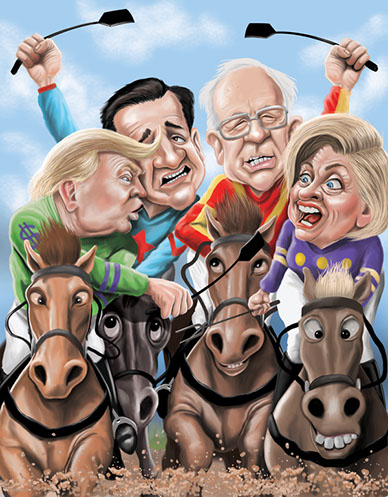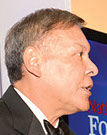


Come November, we’ll have a new president. The election is almost a year away, and for many Americans it’s just a distraction. But the race to the White House has been underway for quite some time, and the primaries in Iowa and New Hampshire are just around the corner.
It’s been quite a ride for the Republicans, thanks largely to the Donald. He’s managed to offend virtually everyone (women, blacks, Muslims, veterans, the disabled) so Latinos shouldn’t take his insults personally. Cruz and Rubio keep nipping at his heels, and Bush is down but still not out. As for the Democrats, Hillary appears to lead the pack despite a near-miss challenge from Biden and her continuing e-mail troubles. But Sanders and O’Malley are still jockeying for position.
Latinos have already made history with two Cuban Americans vying for the GOP nomination, and for once we can’t complain we’re being ignored. Issues like immigration are front and center, and key battlegound states like Nevada, Colorado, and Florida are neither Red nor Blue, but Brown. Latino voters are poised to play a critical part next year in determining not only who will be the nominees, but who will eventually make it to the White House come November 2016.
LATINO Magazine assembled a bipartisan winner’s circle of political consultants, strategists, campaign operatives and journalists for their take on the 2016 presidential campaign. These included Democratic strategist and CNN commentator Maria Cardona; her Republican counterpart, author and pundit Leslie Sanchez; Chuck Rocha, founder of Solidarity Strategies, and former Bush staffer Ken Oliver Mendez; journalists Suzanne Gamboa of NBC Latino and Julio Ricardo Varela of Latino USA; superstar lobbyists Cristina Antelo and Mickey Ibarra; and a few others hanging around the political racetrack.
In the hope of calling the odds, we asked them a few questions that are on the minds of our readers and all Latino voters, such as which candidates will get the Latino vote, which states will decide the election, and whether the Donald’s hair will ever come undone. Some of our experts have already placed their bets and they all have strong opinions, so take their answers with a grain of salt and form your own opinion. But they all agree its been the most exciting horse race ever, even though not a single voter has gone to the polls yet. See you at the finish line!

Leslie Sánchez, Republican consultant
“What’s extraordinary is that we have two Hispanic individuals who are Republican and running for president. ...That was never part of the conversation. ... Someone like Marco Rubio has tremendous appeal because of the relatability of his personal story.”
Melisa Díaz, Democratic consultant
“I think it would be very difficult for any Republican candidate to get the Latino vote, because in their efforts to get into the good graces of the most conservative end of the party for the primaries, they have said things that don’t help them get the Latino vote. It’s an uphill battle for the GOP.”


María Cardona, Dewey Square Group
“Hillary Clinton has a long and rich history with the Latino community, and that contrast will absolutely make Latinos come out and vote. Whoever becomes the Democratic nominee will definitely beat the Republican nominee when it comes to the Latino vote, but I do think it’s going to be Hillary. She is heads and shoulders above the others...”
Chuck Rocha, Solidarity Strategies
“I think the Latino vote is up for grabs. There is a group of older Latinos that have fond memories of the Clinton years, but then there’s this whole group of Obama Latinos who are not wed to any one candidate. Hillary starts in the lead [but] Sanders and O’Malley are running phenomenal campaigns so no one should take for granted that it’ll be for any one Democratic nominee at this point.”


Daniel Garza, LIBRE
“He’s a non-conventional candidate. His narrative is one that people are not used to. It’s unfiltered. It stokes a lot of conversation. I don’t know if that’s a positive or negative contribution to the electoral process, but I can tell you that Latinos are not responding well to it.”
Mickey Ibarra, Ibarra Strategy Group
“Donald Trump is the Republican Party’s worst nightmare. ... He negates whatever progress they have made in the Latino community and puts them in a bigger hole with the community than they should be at this time. Fear is one of the greatest motivators in life, and the fear of Donald Trump very much could drive a much bigger Latino vote than we have seen.”
Larry González, The Raben Group
“I think he will stay in the spotlight and continue to talk about the things he thinks are important, which does not bode well for the party and Latinos. He has not been Latino friendly in his rhetoric. If he doesn’t leave it could bode very badly for the party whether he’s in it or not.”
Ken Oliver Méndez, former Bush White House aide
He’s tapped into a lot of voter concern over the broken immigration system. He’s talking about things that people aren’t accustomed to hearing in such direct language ... and he’s getting it out there. ... Ever since Trump announced the election has been top of the news day after day, and that’s different compared to previous elections this early in the process.”
Leslie Sánchez, Republican consultant
“I think the Democrats will work hard to tether the caustic rhetoric of Donald Trump back to the Republican Party in the general election even if he’s not the nominee. I think the Democrats will try to make the case that he speaks for mainstream Republican voter, and that’s just not the case. I think he’s isolated in this thinking.”
Cristina Antelo, The Podesta Group
“He’s got a playbook that others rightly or wrongly are looking at as being successful, like you can say anything that’s kind of crazy enough and people will just take it as a truth telling and you’ll get a pass. I view it as destructive in that way. This is leading us to a place where we’re not going to care how our words impact others.”
Felix Sanchez, NHFA
“His legacy is going to be in trying to use Latinos as a wedge issue in this election. By the GOP not standing up to him, not saying anything about his rhetoric, they hurt themselves with the Latino community. He’s brought the community together, he’s been in a way a useful organizer for the Latino community. I’ve never seen this type of urgency this early in the campaign cycle.”



Omar Franco, Becker & Poliakoff
“This is important to a subsection of the community, and other issues are more important for others such as terrorism, jobs, the economy. But there are strong candidates on this issue including Jeb Bush and Marco Rubio, and if they are elected they will roll back Obama’s actions on Cuba.”
María Cardona, Dewey Square Group
“Unless you are a Cuban American, it doesn’t register as high up on the scale of issues that are important to you, and even among Cuban Americans. If you are younger Cuban American, you agree with what the president did.”
Ana Radelat, journalist
“I don’t think Cuba is going to be an issue in this election. At one point in history, candidates needed to adopt a hardline to win in Florida, but that has completely changed. Most Americans support what the president did. Rubio might make an issue of it, but even he has to know that it’s not an issue outside of Little Havana. It’s just not on the front burner.”


Catherine Pino, D & P Creative Strategies
“Virginia, Colorado, Ohio, Arizona, North Carolina (which had the largest percentage of Latino population growth of any state in the last census). Those states are going to be critical to see if we actually are able to turn out our folks to vote.”
Cristina Antelo, The Podesta Group
“Florida, especially if Marco Rubio or Jeb Bush is the GOP nominee. Ohio, Pennsylvania, and the states in the West, which used to be reliably red and are now becoming purple because of the Latino vote, such as Colorado and Nevada.
Leslie Sánchez, Republican consultant
“Arizona, Nevada, Colorado, Utah, and New Mexico are among the key ones. They are dynamic economies, some are majority minority, culturally diverse, and look like the new mainstream.”
Mickey Ibarra, Ibarra Strategy Group
“Some may not be so obvious, such as ... Illinois, Ohio, Michigan, where there are significant populations of Latinos, even Virginia, such as in northern Virginia. The Latino population there could make all the difference.”
Daniel Garza, LIBRE
“Florida, Virginia, North Carolina and Ohio, Nevada, Colorado. Latinos are going to matter very much. It’s one of the most important constituencies heading into 2016, and both parties are going to be aggressively courting the Latino vote, and that’s good for Latinos.”



María Cardona, Dewey Square Group
“They are critically important. We know not all Latinos speak Spanish or are Spanish dominant, but almost half of Latino voters do speak Spanish and do consume news in both English and Spanish, and like to see their elected officials have the respect to communicate in their language.”
Julio Ricardo Varela, Latino Rebels and NPR’s Latino USA
“It doesn’t hurt. I think it’s important to have Spanish-language debates. There are a lot of new voters who get most of their news from the Spanish-language networks. More people are paying attention this time around, and Spanish-language debates help inform the community about the candidates and the issues.”
Ingrid Durán, D & P Creative Strategies
This election is different than others, because of social media and the attention this campaign has gotten is big. It’s critical for everyone to engage with the Latino community and it’s important that Latinos have an opportunity to hear from the candidates.”
Ken Oliver Méndez, former Bush White House aide
“I’m very much a proponent of Spanish-language engagement and not leaving the field occupied to Democrats, as that would be a horrible mistake.”
Larry González, The Raben Group
“I think it’s important when you can reach an audience as wide as you possibly can. Especially for new voters, naturalized citizens, who continue to get their news and information from Spanish-language networks.”
Cristina Antelo, The Podesta Group
“If you’re a Republican candidate you already think you don’t get a fair shake anyway from the Spanish-language networks... . Does it make sense for the Republicans to bring their message to Spanish-speaking households? Yes. I just don’t know if the two options they have are the ones they feel they can be successful with.”



Mickey Ibarra, Ibarra Strategy Group
“I think that absolutely a Latino would be considered... .Castro will definitely be on the short list, but there are others, such as Ken Salazar of Colorado. One of the requirements for the vice presidency is they have to secure their home state, and it is a steep hill for Castro to climb in securing Texas, as opposed to Ken Salazar, and Colorado is very much in the mix.”
María Cardona, Dewey Square Group
“It’s really too early to tell. I know a lot of people want to push Julián Castro’s name out there, but I don’t know how real that is. I think it would be terrific and a point of pride for our community, and certainly would be something that would be under consideration in the Clinton campaign, but I think they are now focused on what she needs to do to be the nominee.”
Felix Sanchez, NHFA
“We want to hope for that, and it certainly elevates the community to have Latinos in a non-traditional role such as a vice presidential nominee. Castro brings a great deal of pride to the community and he is as close to a political rock star as possible. The ballot needs to reflect the changing demographics of the country and he certainly would.”


Suzanne Gamboa, NBC Latino
“Jobs, the economy, education, having good-paying jobs and good schools... . Immigration reform is going to be a factor in different ways as a candidate’s stance on the issue gives people a sense of how they would vote on other issues, it gives them a sense of their humanity.”
Pilar Marrero, La Opinión
“While immigration is an important issue for Latinos, so is access to education, having a good job, and making sure the economy is going well for everyone.”
Leslie Sánchez, Republican consultant
“Aside from immigration, it’s about jobs and the middle class. Voters are looking for a candidate who inspires them to believe that better days are ahead and who cares about their families.”
Chuck Rocha, Solidarity Strategies
“From recent polling we’ve done in the community, the number one issue is education, the number two issue is jobs and the economy, the third issue is healthcare, the fourth issue is immigration.”
Ken Oliver Méndez,
“Economic opportunity, education, law and order, also national security and dealing with ISIS.”